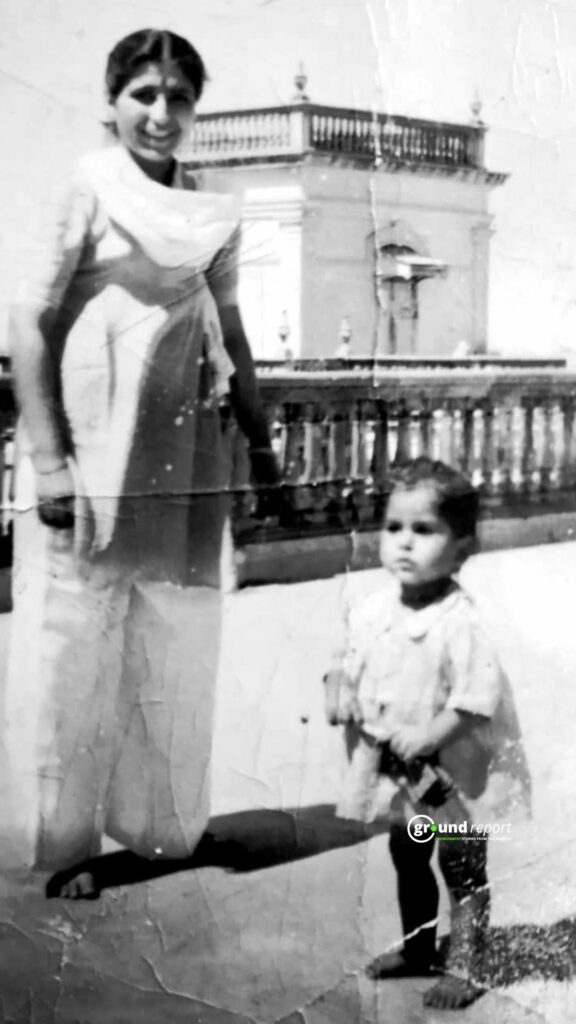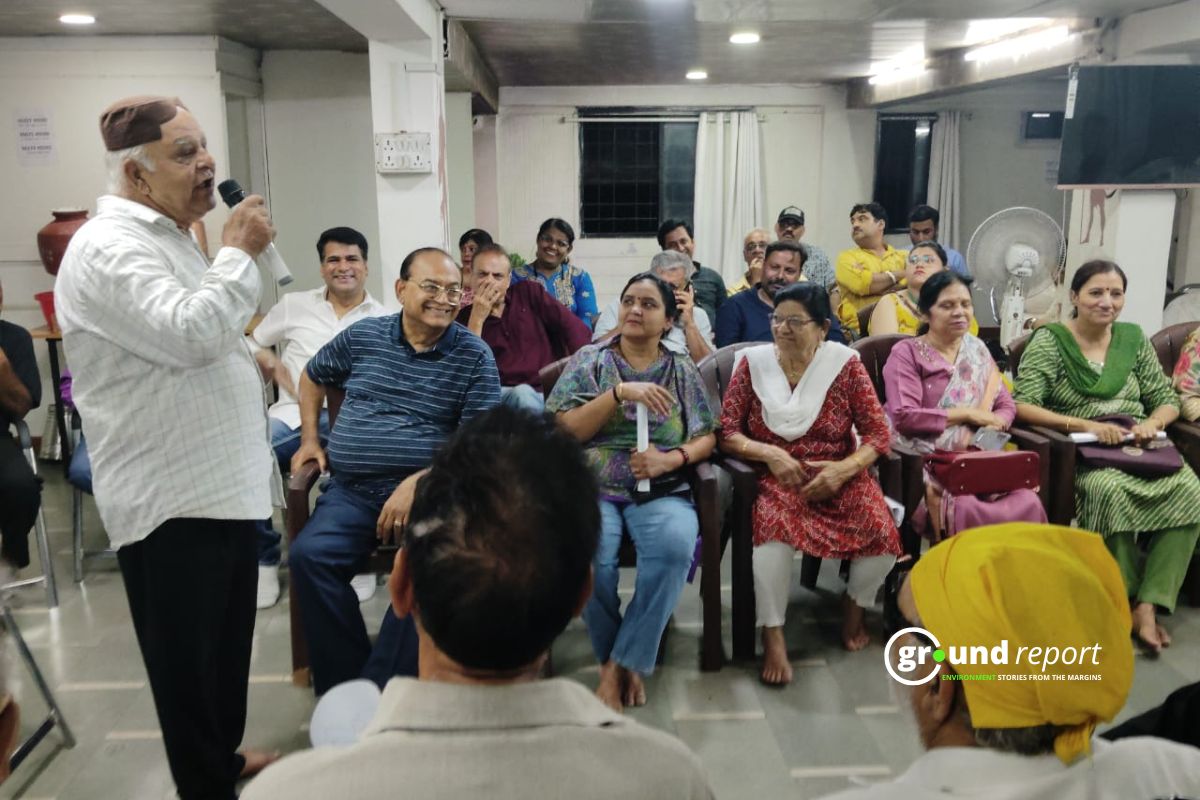In April of 2024, Kishore Kodwani, 70, was sitting two chairs away from me in the humid-hot evening of a low-ceiling building. Workers at his meditation center served us diluted chai. To help the Sindhi community, which he belongs to, he has put decades of his community work and activism to use and set up a small meditation center near Deva Shree Cinema Hall in Loha Mandi, Indore. For almost 20 months now, Kodwani has led an experimental reconciliation model with 25 volunteers. “Every day for two hours, five people join me in making decisions.”
His social standing, built through 40 years of shoe-leather activism, gives him the credibility to mediate property disputes, family feuds, and divorces. Through organizing fast-until-death protests and filing petitions, he has fought for the city of Indore on numerous issues like cleaning of the rivers, tree cutting, the city’s basic infrastructure, metro construction, and the bus rapid transit system (BRTS), a dedicated fast-lane bus service.
Kodwani is intense. If I remember correctly, he smoked three cigarettes in a conversation that lasted less than an hour. He listens well to respond with great precision. But it is difficult to trace Kodwani’s life. Everyone knows his raw and unpolished way of speaking, often punctuated with abusive words. He is described by several local officials as determined and strong-headed, in some ways hard to deal with too. With some exceptions, almost no one doubts his intent. He has data and maps of the city, which local officials often lack—many people claimed.

He has a simple rule: “Don’t talk about someone’s character and corruption.” He said in a principled tone how this rule, even without a formal college degree, gets him into rooms and makes change. “You won’t even find 20 RTIs (right to information) applications by me,” he said, “but you’ll find a 250-square-foot room filled with records.”
Before his birth, on 11th October 1955, his father, one of the founding members of Jana Sangh—precursor to the ruling Bharatiya Janata Party, in the early 1950s, was devoted to organizing people from Sindhi communities across India. Sindhi’s are ethno-linguistic groups belonging to the Sindh region, now in Pakistan. Most Sindhi Hindus came to India after partition, while Sindhi Muslims remained in Pakistan. He nurtured social work from his father, but his mother had a “creative influence” on him.

He studied in an RSS-run school, a Hindu right-wing organization school known to teach Hindu ways of living and strict disciplinary etiquette. “Discipline is in my genes. And values have been fed to me like a dose,” he said. But here is a contradiction. He was a menace as a kid. While he was being disciplined in an RSS-run school, he grew up to be more stubborn. And he owns it.
He recalled, “When I got 86% in pre-boards and zero in finals, my father slapped me for not listening to my mother… After that day, I decided that I would only work and would not study.” He didn’t go to college. He refuses to talk about his parents but agrees that his father’s approach towards parenthood has left a lasting impression. As he stated, he was told to leave the house and stand on its own. He didn’t explain but rather abruptly halted the conversation: “Won’t say anything against my parents… they are both dead.”
With great brevity, he narrates the tale of his awakening in his mid-20s: Rajendra Mathur, an editor of a local daily, organized a symposium at the Press Club about the city’s pollution and greenery. That led to a government initiative called Hariyali Mahotsav, “Tree Festival.” Citizens raised ₹2 per sapling and planted them in memory of loved ones. Several years later, when authorities began cutting down those very trees, he said, “My nature changed… into a protester. Since then, I have been fighting in the courts.”
His struggles for the city have been decades old. At the age of 29, in the 1990s, he organized a fast until death. He had a 350-rupee budget, and instead of taking garlands from people who attended the protest, he took money. “I sat on an indefinite fast on five issues: Indore’s Traffic Engineering Cell, Narmada Phase II, District Hospital, Ring Road, and city transport.” He didn’t plan to protest—it was instinct. “If I believe something to be true, it is my soul that is saying it, not my mind.” The city eventually bent. “On the seventh day, the Divisional Commissioner and Police Commissioner met me. The next day, my demands were accepted.”
Indore is India’s cleanest city. There are dustbins outside each shop, even in the crowded markets. Sometimes, even two— for both wet waste and dry waste. The roads are cleaned every night, and at dawn municipal workers are seen cleaning the alleys and gullies. When I visited Indore, I used to wake up to the tunes of municipal waste vehicles’ jingle— Gadiwala aaya chal kachra nikal, roughly translated to “The waste picker is here, get your trash out. This—segregation, and disposal of waste—is a simple morning routine which almost all indoreis take great pride in.
Though, Kodwani has seen Indore strain under the weight of its own growth. Air quality now regularly crosses an AQI of 100. Summers bring the city’s worst water crisis, with warnings of severe water risk by 2030. The municipality spends heavily to lift water from the Narmada River, 70 kilometers away—making it the costliest water supply in the country. A population boom and governance negligence has outpaced infrastructure, and concrete has replaced green cover.
The two rivers in the city—the Kahn and Saraswati— remain polluted, even after court orders and a task force. The water looks dirty, but it is clean, one civil servant part of the smart city initiative said to me. He meant that the water passed all the testing parameters, and the decades of sediment deposits at the bottom are making the river look murky and black. When I told Kodwani this, he aggressively responded, “Take me to that place… I will commit suicide if the water in the river is clean.”
Because in September of 2018, Kodwani was sitting on the concrete banks of the same polluted Kahn River. With his feet dipped till his toes, he was just wearing a vest and a typical Sindhi cap on his head. A local news outlet called him Indore ka Gandhi, “Gandhi of Indore,” for his satyagraha—nonviolent resistance—to save the rivers. A journalist for a local news outlet, Neha Jain, met Kodwani during this protest for the first time. She recalled that he was later admitted to the hospital because he contracted an infection, or, as Kodwani explained it, “an acidic reaction.” Jain agrees that he is strong headed, but remains in contact with comments in her reports.

Sameer Sharma from Swaha Resource Management—an Indore-based energy start-up—said, “People like Kodwani are rare… they have deep passion for the city.” Sharma runs a Facebook page, Indorewala, a colloquial way of saying: ‘from Indore,’ with deep pride. His maternal grandfather and Kodwani’s grandfather worked together for Indore’s local newspaper.
He is stubborn, and it is virtuous for him. It’s his way or the highway. He would barge into court compounds and municipality offices. On one such occasion, he went into the municipality office in a vest and pajamas. He was later interviewed and answered questions nonchalantly, as if nothing unusual had happened. Atul Seth, a former engineer in the local municipality, instantly talked about the rigidity in Kodwani’s ways. He criticized his ways, at the same time mentioning, “I don’t dislike him.”
He is a dichotomy, refusing to be understood and boxed. Every time I asked him about his family, he refused to dwell deeper and rather brought the subject back to his activism. Almost telling me this is how you should know me: through his activism. If I take his bait, then what I know is that he has a great purpose for his city. He may come off very cynical till he recounts his interactions with the official. If you have to displace several people from unauthorized colonies/slums to ensure the city doesn’t flood, without flinching Kodwani will say yes. He is practical, with all intentions to make a difference. He wants to fight the long fight and is ready to wait for 10 years to find a solution. He is very impatient; at the same time, he responds to you with great patience.
I reached out to several journalists, local municipality (nagar nigam) officials, and other activists. Almost everyone knows about Kodwani. But only about his activism. No one denies his passion for the city; rather, they appreciate it. There is an influence that he now has over local authorities and the courts. He has turned down a Padma Shri—the fourth-highest civilian award—nomination and requests to contest local elections. Kodwani possibly is ‘rare.’ I asked him why he continues to fight for the city even after so many years, even after things haven’t changed much. While smoking his fourth cigarette of our conversation, he said, “I’ll be gone in a few years… this is for your generation.”
Support us to keep independent environmental journalism alive in India.
Keep Reading
Highway Halt Puts Kashmir’s Fruit Economy at Risk
MP brings back Bhavantar as farmers lose soybean harvests
Stay connected with Ground Report for underreported environmental stories.
Follow us onX, Instagram, and Facebook; share your thoughts at greport2018@gmail.com; subscribe to our weekly newsletter for deep dives from the margins; join our WhatsApp community for real-time updates; and catch our video reports on YouTube.
Your support amplifies voices too often overlooked, thank you for being part of the movement.







